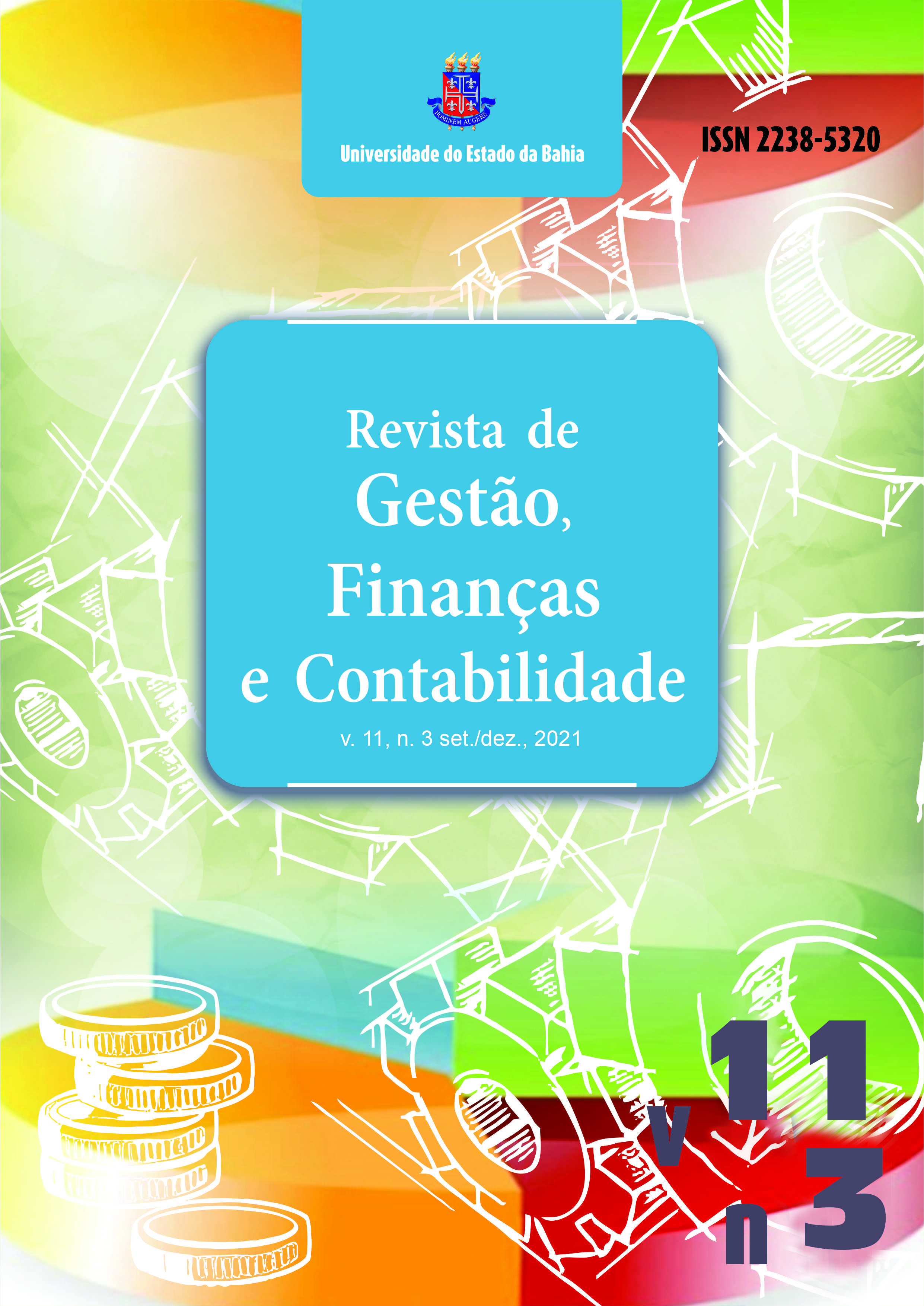THE IMPACT OF THE VARIABLE FINANCIAL SITUATION ON THE PROPENSION TO RISK
DOI:
https://doi.org/10.18028/rgfc.v11i3.6012Keywords:
Prospectus Theory, Financial Situation, Risk Propensity, Certainty Effect, Reflex EffectAbstract
The objective of this research was to investigate the impact of the variable financial situation on the propensity to risk in the field of gains and in the field of losses. In this case, 87 students and former undergraduate and graduate students from the Accounting and Administration courses at the Federal University of Bahia (UFBA) participated in the study. Respondents gave their opinion about their risk preferences in two scenarios with identical questions, but simulating different financial situations, namely: low financial condition (scenario 1) and high financial condition (scenario 2). The Wilcoxon test was used for analysis. Participants were more prone to risk in scenario 2. The differences between scenarios were statistically significant at 0.00% in the field of gains and 4.7% in the field of losses, indicating that the greater the individual's wealth in relation to the value put at risk, the greater their propensity to risk. The wealth variable also caused anomalies in the certainty effect and in the reflection effect of the prospect theory, as people were more prone to risk in the field of gains than in the field of losses, especially in scenario 2.
Downloads
References
BARRETO, P. S.; MACEDO, M. A. S.; ALVES, F. J. S. Efeitos framing e certeza sob a ótica da tomada de decisão em ambiente contábil. Revista de Administração, Contabilidade e Economia da FUNDACE, 5 (2), 1-16. 2014.
CAMERER, C. Behavioral Economics. Current Biology, v. 24, nº 18, p. 867-871, set. 2015.
CARDOSO, R. L., RICCIO, E. e LOPES, A. B. O Processo Decisório em um Ambiente de Informação Contábil: um Estudo Usando a Teoria dos Prospectos. BASE – Revista de Administração e Contabilidade da Unisinos 5(2):85-95, maio/agosto. 2008.
CORTÉS, R. L. de G, et al. Influencia del nivel de avance educativo y el género en la toma de decisiones financieras : una aproximación desde la Prospect Theory. Revista Finanzas y Política Económica, Vol. 12, N.° 1, enero-junio, 2020.
DIAS, A. T. B. B. B., ALBERTON, A. e PORTO JUNIOR, A. de S. Finanças Comportamentais: Um Estudo com Professores Universitários sobre o Sentimento de Aversão à Perda. XXXVIII EnANPAD, Rio de Janeiro/RJ, 07 a 11 de setembro. 2013.
GAVA, A. M. e VIEIRA, K. M. Tomada de Decisão em Ambiente de Risco: uma Avaliação Sob a Ótica Comportamental. REAd –Edição 49 Vol. 12 No. 1, jan - fev. 2006.
HAUBERT, F. L. C. Finanças Comportamentais: um Estudo Comparativo com Base no Perfil do Investidor de Estudantes de Cursos Stricto Sensu Brasileiros e Portugueses. (Dissertação de Mestrado). Universidade do Sul de Santa Catarina, Florianopolis, SC, Brasil. 2011.
KAHNEMAN, D. and TVERSKY, A. Prospect Theory: An Analysis of Decision under Risk. Econometrica, v. 47, issue 2, p. 263-91. 1979.
Keller, R, e Wang, Y. Information Presentation in Decision and Risk Analysis: Answered, Partly Answered, and Unanswered Questions. Risk Analysis, 1-14. 2016.
KRUGER, S. D. et al. Processo decisório sob efeito de preferências: aversão e exposição ao risco. Revista Contemporânea de Contabilidade, v. 15, n. 36, p. 166–187, 2018.
MAHMOOD, Z., et al. The effect of hueristics, prospect and herding factors on investment performance. Pakistan Journal of Social Sciences – PJSS, 26 (1), 475-484, 2016.
MEDEIROS, J. T. et al. Tomada de decisão financeira sob condições de incerteza: estudo com alunos de graduação de contabilidade e administração de empresas. Revista de Contabilidade e Organizações, [S. l.], v. 11, n. 30, p. 36-45, 2017.
PEREIRA, B. A. D., LOBLER, M. L. e SIMONETTO, E. de O. Análise dos Modelos de Tomada de Decisão Sob o Enfoque Cognitivo. Rev. Adm. UFSM, Santa Maria, v. 3, n. 2, p. 260-268, mai./ago. 2010.
PEREIRA, L. A. C., et al. Reações de Afeto no Processo Decisório Gerencial das Organizações: uma Abordagem a Partir da Prospective Theory. Revista Contabilidade Vista & Revista, v. 21, n. 1, p. 131-155, jan./mar. 2010.
SAMPAIO, M. S., et al. Excesso de Confiança e Controladoria: um Estudo Envolvendo Práticas Orçamentárias. Revista de Finanças Aplicadas, pp.1-20. 2012.
SILVA, L. N. e, et al. Reduzindo a tributação cognitiva: lições comportamentais para a diminuição dos efeitos psicológicos adversos da pobreza. Rev. Bras. Polít. Públicas, Brasília, v. 8, nº 2, 2018.
SIMON, H. A. A Behavioral Model of Rational Choice. The Quarterly Journal of Economics, Vol. 69, No. 1, pp. 99-118. 1955.
SOUZA, E. M. de. Classe social e produção de desigualdades: uma análise culturalista de classe. Revista Eletrônica de Ciência Administrativa, v. 19, n. 2, p. 181-202, maio 2020.
TVERSKY, A. and KAHNEMAN, D. (1979). Judgment under Uncertainty: Heuristics and Biases. Science, New Series, Vol. 185, No. 4157. pp. 1124-1131. Sep. 27, 1974.
WANG, Y., FENG, T., & KELLER, L. R. A further exploration of the uncertainty effect. Journal of Risk and Uncertainty, 47 (3), 291-310. 2013.
Downloads
Published
Issue
Section
License
Autores que publicam na RGFC concordam com os seguintes termos:
- Autores mantém os direitos autorais e concedem à revista o direito de primeira publicação, com o trabalho simultaneamente licenciado sob a Creative Commons Attribution License (https://creativecommons.org/licenses/by-nc/4.0/), permitindo o compartilhamento do trabalho com reconhecimento da autoria do trabalho e publicação inicial nesta revista;
- Autores têm autorização para assumir contratos adicionais separadamente, para distribuição não-exclusiva da versão do trabalho publicada nesta revista (ex.: publicar em repositório institucional ou como capítulo de livro), com reconhecimento de autoria e publicação inicial nesta revista;
- Autores têm permissão e são estimulados a publicar e distribuir seu trabalho online (ex.: em repositórios institucionais ou na sua página pessoal), já que isso pode gerar alterações produtivas, bem como aumentar o impacto e a citação do trabalho publicado. Porém deve-se observar que uma vez aprovado pelos avaliadores, o manuscrito não poderá sofrer mais alterações. Caso o autor deseje fazê-lo, deverá reiniciar o processo de submissão.




